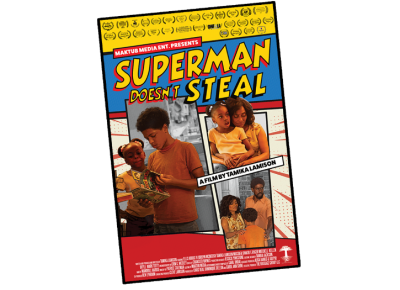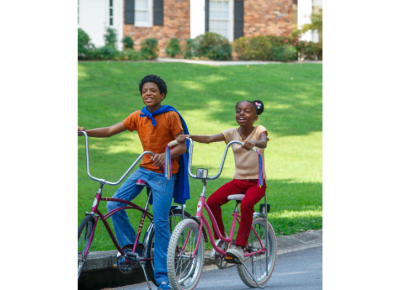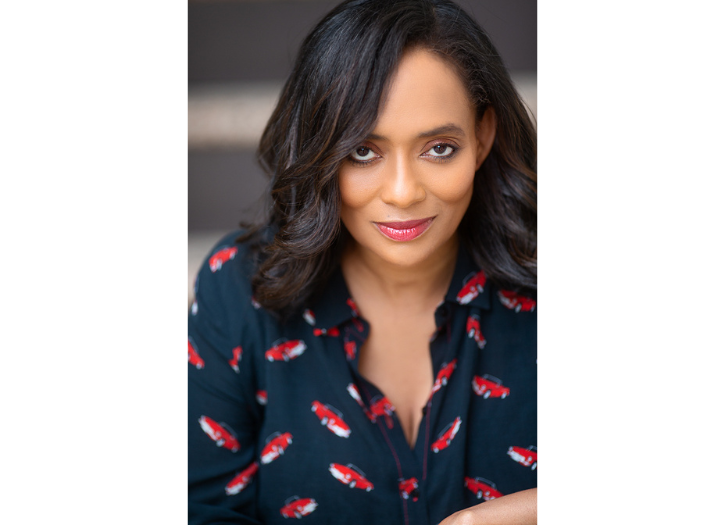In the world of storytelling, few filmmakers have the gift of blending heart, history, and heroism like Tamika Lamison. An award-winning writer, director, and founder of the Make A Film Foundation, Tamika uses her talents not only to entertain but to empower. Her latest project, Superman Doesn’t Steal, is a captivating short film that follows a young brother and sister in 1970s Atlanta, delving into their fascination with superheroes as they grapple with the unsettling events of the Atlanta Child Murders. The film, celebrated for its powerful storytelling, recently won multiple awards across the festival circuit, and is being expanded into a feature.
Celebrated actress Aunjanue Ellis praises the film, saying, “Superman Doesn’t Steal allows us into that rarefied space of a Black child’s imagination where flight and fearlessness play. It reminds us, capes are worn by mothers and fathers and that love, complicated, but abiding love, is the letter-chested hero.”
Tamika’s dedication to amplifying untold stories and creating space for others shines through her impressive body of work, which includes everything from Sundance-finalist scripts to series like Monogamy on Amazon Prime/ALLBLK. Her nonprofit, the Make A Film Foundation, enables children with life-threatening illnesses to share their voices and stories on film, a mission that reflects her core belief in storytelling as a transformative power.
In this exclusive feature, SHEEN Magazine dives into Tamika’s journey, her inspiration behind Superman Doesn’t Steal, and how she continues to use film to create empathy, visibility, and hope.

“Superman Doesn’t Steal” explores deep and emotional themes during a pivotal time in history. What inspired you to tell this story through the lens of young siblings fascinated by superheroes?
My Brother, Cleve, collected comic books when we were kids. We were both into superheroes and we used to play Batman and Robin. He would always cast me in what I felt was the ‘lesser’ role as Robin- because I was a girl. The idea that we can all be superheroes or villains at any time, depending on our choices- was fertile ground to explore a variety of these deeply personal emotional themes- especially in relation to the charged and harrowing time of the Atlanta Child Murders
How did growing up in Virginia and attending Howard University shape your journey into filmmaking and storytelling?
Growing up in Virginia in the south inevitably shaped my storytelling in unique ways. It was a time of innocence. A time where we would go outside and play until the streetlights came on. We’d have to make up games to amuse ourselves. We didn’t have all the technology, etc. like we do today. My brother and I would make up stories, cast them with the neighborhood kids and direct & act them out amongst ourselves. We were really compelled to use our imagination in a lot of different ways. Because we didn’t have cell phones, etc.- it was books for me. I read a lot which lead to writing, which lead to acting, which eventually lead to wanting to direct and produce.
Attending Howard specifically, connected me more viscerally to my ‘roots’ as a Black Creator- it also connected me to a lot of other incredible Black Creatives. It immersed me in Black films and theatre that wasn’t as prevalent at American University. I studied acting at Howard. And- I also studied Acting, Creative Writing & Screenwriting at American University. With Howard- Learning about Black Filmmakers and seeing films like “The Five Heartbeats” (Robert Townsend), “She’s Gotta Have It” and other Spike Lee Films as well as Daughters of the Dust (Julie Dash)- these films really shaped my idea of the types of stories we could tell and the types of stories I wanted to tell. Just seeing that African American filmmakers had a platform to tell authentic, yet unique and interesting stories about Black people made a huge impact on me as a storyteller & filmmaker.
Your film addresses the Atlanta Child Murders of the 1970s, a tragic part of American history. How did you approach this sensitive subject matter while maintaining the integrity of the characters and their experiences?
This was a personal story based on a core memory shared by my brother and I when we were growing up. You didn’t have to live in Atlanta to be terrorized by the possibility of a killer on the loose who was snatching and killing Black children. Black families everywhere- all over the nation- were on edge and living in fear. The fear that there was a killer on the loose murdering Black children- any and all Black Children- anywhere- at any time- period. The incident depicted in our film took place in Virginia, but we set the film in Atlanta due to resources and finding the most appropriate location visually- but also to raise the stakes. We also knew we would be expanding the film into a feature and planned to shoot that in Atlanta as well. It made sense. For the short film, which is a proof of concept, the Atlanta Child Murders is the backdrop. And we deal with it honestly and authentically with actual news stories, radio stories, etc. In the expanded version- the feature- we mix real events, including some from our personal story, with additional plot and characters created with artistic license to build an entirely new dramatic narrative.

You’ve won several prestigious awards for “Superman Doesn’t Steal” at major film festivals. How does it feel to have your work recognized on such a global stage?
To have been honored with being selected to screen at 50+ festivals and to receive so many awards has been overwhelming. I could never have predicted this unbelievably positive reception for the film. I believe that this moment was designed by my Ancestors for this story to be brought forth at this time. It was practically dictated to me via the spirit- muse- ancestors- insert whatever word makes sense to you. And I listened and moved with this project at every step with purpose as I felt it was what I was called to do. In the middle of two strikes. Never feeling like I was ‘ready’ but still knowing I had to make this film. And I had to make it now. So I am deeply grateful and truly moved by each and every person that shares how the film impacted them, by every festival, by every screening and by every award. I take nothing for granted. Every positive acknowledgement allows me to then show gratitude to my stellar cast and crew who were extraordinary and are a huge part of this film’s success. I really cannot thank them enough. So, to have ‘our’ work recognized on a global stage is a magnificent validation for me as the writer/director/producer and everyone who chose to work on the film because they believed in the story- and believed in me.
You’ve created the Make A Film Foundation, which grants film wishes to children with life-threatening conditions. What inspired you to start this non-profit, and how has it impacted your work as a filmmaker?
The Make A Film Foundation is definitely what I consider another part of my purpose. My inspiration stems from a ‘Hollywood Story”- lots of people have their ‘Hollywood Story”. Mine started when I sold my very first screenplay “The Jar By the Door” for six figures. It was such a huge moment for me. I had already started to spend that check (lol). But then… we realized that the check was bad. It was what they call a ‘rubber’ check. All it was good for was bouncing. I was devastated. But I didn’t want something like that to have the power to disappoint me. I wanted to empower myself in the use of my gifts and talents. So, I opted to volunteer all around California with various non-profits & schools teaching- writing, directing, acting & filmmaking. A good friend then asked me if I could do anything, what would it be? I said, “Aside from filmmaking- I would grant wishes to kids in the Make-a-wish foundation.” I figured if that is what I wanted to do then I should do it. So I combined those two passions and “Make A Film Foundation” was born. We have been operating for over 15 years, have made 4 Award winning short films with A list talent in front of and behind the scenes and over 100 documentaries. Some of the terrific talent that has worked with us include Actors: Kerry Washington, Michael Ealy, Johnny Depp, J.K. Simmons, Sean Astin, Laura Dern, David Lynch, Hailee Steinfeld, Ernie Hudson & Chad Coleman;
Directors: Catherine Hardwicke, Sam Raimi, Theodore Melfi, Rodrigo Garcia, Patricia Cardoso & Jon Poll. Make A Film Foundation has impacted my work in a myriad of ways. From a creative pov it has shaped me as a Producer. Producing these Studio level short films with A List talent and little funds as all were donating their time and working with volunteer Union crews etc. really helped me to understand how to put a film together, what is needed on set, and how to deal with multiple personality types. I learned so much building this organization. From a spiritual perspective- I am always reminded of what is important when I remember all of the children that we have created films with/for who often had but 2 wishes- to make a film & to live.

You’re currently expanding “Superman Doesn’t Steal” into a feature film through Dan Lin’s Rideback Rise Fellowship. Can you share more about your vision for the feature and what you hope to achieve with it?
My brother Cleve and I are writing the feature of “Superman Doesn’t Steal” together. I wrote the first draft based on an outline that he crafted from our discussions and continued to develop it in the Rideback Rise Fellowship Circle with the support of the outstanding screenwriting Professor/Writer- Jessica Sharzer. My brother wrote the next draft. The script was chosen for the Gotham Project Market, and we met with several companies who were interested in learning more. We also got invited into the 2nd round of the Sundance Screenwriting Lab. Sundance is such a hard nut to crack that any potential entree or nod is deeply appreciated and a huge honor. In the expanded version of the film, we build the community a lot more and we focus on the family dynamic. We also have created additional kid characters who form a motley crew that share their love of superheroes and comic books. We bring more of a thriller aspect in as one of the kids disappears and the other kids in the crew feel like they must find out what happened. And we expand the story plot that includes the Atlanta Child Murders and pepper some of the real incidents that happened during that time within the story. We have added quite a bit more to the feature. Our goal is to expand the story, while keeping the core incident from the short proof of concept and maintaining the tone that was established in the short film. We want to create a feature version that is as impactful and as lauded as the short. And of course- premiering at (and winning) Sundance wouldn’t be too shabby either. Dream Big!
As a Black woman in the film industry, what challenges have you faced, and how have you overcome them to build such an impressive career?
Well now, that’s a loaded question. (lol) I have faced all the typical challenges (racism, sexism, ageism- all the ‘isms’) and a few additional challenges thrown in for good measure. I am still facing these and other challenges. I don’t even know if I actually have ‘overcome’ some of these challenges. Most of the time- I just take note of them and move on. I mean- that’s typically someone else’s ish. So- Duly Noted. I have work to do. Next… I mean, sometimes I call people on their BS. It’s honestly their problem as long as it doesn’t affect my work or ability to work. If I am in a situation where I can bring a fight to it that will actually help me move forward in some way or gain something that makes sense, then I would say yeah- in that scenario I may overcome some of those challenges. In direct relation to how I was able to make this film- I was working at a production company that quite frankly stole from me and treated me horribly- in a way that I could legally prove. I fought them and got a settlement. And because the money was triggering for me- I used it to make this film right here- “Superman Doesn’t Steal”- and I have never looked back. I am grateful now for the experience because it allowed me to make this film. Just saying that truth makes me so happy! It fills me with joy. That is the kind of win that is a legacy win. I think you have to know when to fight, when to flight and when to figure out how to work in a- not ideal situation- in a way that works for you. To answer your question directly- As a Black woman I feel my biggest challenge is people under-estimating me, not believing in me and questioning my ability to do- well anything and everything. The way that I have overcome that is by doing it. Whatever it is. With Excellence. Being Undeniable. That’s literally it. I keep working. Keep building. Keep getting better. It’s like career legos. You build by stacking one block at a time. And you just keep building. Block by Block. Once I build one thing- I get busy building something else. I never let someone else’s lack of faith get in my way. The only person that needs to believe in me is me.
With so many accolades, including the Gordon Parks Indie Film Award and being a Sundance Finalist, how do you stay grounded and continue pushing creative boundaries in your projects?
It’s easy to stay grounded when you’re still trying to pay your bills. (lol) Nothing grounds you like the need to pay the rent or a mortgage. Also- the world and everything that is happening in the world socially & politically- especially now- helps keep things in perspective. Interacting with children that are terminally ill who just want to live- and make a movie is very sobering as well.
The way that I continue to push creative boundaries is by paying attention to the world, studying films, living life- experiencing the world and continuing to learn and build my skills as a creator. There are so many resources available to sharpen your skills. You can learn filmmaking online. But you then need to apply it. It can’t just be ‘in theory’ you’re a filmmaker. I still take Sundance Collab classes, Master classes and various webinars and other classes. I read books and attend workshops. I visit camera houses. And I check in with myself to see where I can source personal stories that may be a bit uncomfortable but also may need to find their way into the world by way of my voice in cinema. Fear is not a factor for me. (It is-(lol) but I just need to muster up my courage and move through it.
How do you balance your work as a writer, director, and producer, and what advice would you give to aspiring filmmakers looking to navigate these roles?
I am not sure I would call my version of being a multi-hyphenate a ‘balance’. 
What message do you hope viewers will take away from “Superman Doesn’t Steal,” and why do you believe it’s particularly relevant in today’s world?
There are so many messages in “Superman Doesn’t Steal”. One of the messages is that we can all be hero or villain. At any time. What separates that label- is choice. We can step into our power, or we can choose to give it away. Each family member has a different perception of what a hero and a villain look like in this film. And it changes as the individual characters change. One of the most powerful messages I feel is present in the film is the truism that Black people- Black children specifically in relation to this film- cannot make mistakes. They simply don’t have the room to make mistakes. Because in the world that we are in if a Black child makes a certain type of mistake- it can cost them their life. This has always been true in the past and it remains true today. We have a NYTimes quote in the credits at the end of our film and it’s one of the reasons that I think this story- set during the Atlanta Child Murders- is particularly relevant now. The quote reads: “Investigators are now reviewing a 15-year-window, from 1970 to 1985, during which 157 children were murdered in the Atlanta area, including the previously known victims…” New York Times
I can’t think of a better time to explore a narrative film from the pov of a motley crew of Black comic book loving kids & a Black community & family.







Add Comment